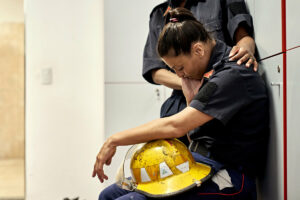Struggling as a First Responder Couple? You Can Reconnect with Expert Support
Being on the front line isn’t just a job—it’s a way of life. The demands are relentless, affecting every aspect of well-being, especially personal relationships. The stress of responding to emergencies, unpredictable schedules, and trauma weighs heavily on home life, especially between partners.
First responders in Maine—whether firefighters, law enforcement, or EMTs—often find themselves struggling with these intense pressures. But these challenges do not need to be faced alone. Couples therapy, specifically designed for first responders, can help rebuild essential connections and strengthen relationships.
At Guiding Light Behavioral Health, under the expert guidance of Sarah Mildrum, LCSW—Maine’s first Emergency Responder and Public Safety Certified Clinician (ERPSCC)—couples therapy is uniquely tailored to help first responders overcome their toughest relationship challenges. In this article, we explore how specialized therapy can help you create a healthier, more resilient relationship.
-
How Does Couples Therapy Help First Responders and Their Partners?
Couples therapy helps first responders and their partners by addressing the unique stressors of high-stress professions. It fosters better communication, emotional intimacy, and resilience while creating safe boundaries between work and home life. It also provides specialized support like peer support groups and post-critical incident consultation.
-
Why Should First Responders Choose Specialized Couples Therapy Over Traditional Therapy?
Specialized couples therapy for first responders considers the intense challenges of trauma exposure, unpredictable schedules, and emotional exhaustion. Traditional therapy may lack the specific understanding needed for these challenges, while specialized therapy provides a relevant approach that directly addresses these unique pressures.
-
Can Couples Therapy Prevent Burnout and Improve Emotional Health for First Responders?
Yes, couples therapy can be a critical resource in preventing burnout by addressing emotional fatigue and anxiety. It empowers both partners with coping tools, improves sleep quality, and creates a supportive environment at home, all of which are key to managing stress and maintaining well-being.
-
Why First Responders Deserve Specialized Couples Therapy
Traditional couples therapy may help, but it often doesn’t fully address the specific struggles of a high-stress, trauma-heavy profession. First responders’ lives are filled with unpredictable hours, high-stakes situations, and emotional exhaustion.
Couples therapy for first responders, like the sessions offered at Guiding Light Behavioral Health, recognizes these dynamics. It provides a safe space to voice concerns, share experiences, and develop constructive ways to cope with the emotional weight carried home. This type of therapy also helps develop strategies to handle stress better and communicate effectively with your partner about the pressures you both face—a vital part of keeping the relationship strong despite outside stressors.
Our approach goes beyond typical sessions. It helps identify trauma symptoms and address emotional needs specific to first responders and their partners. As Sarah Mildrum, LCSW, explains: “Being able to express the toughest parts of your day without fear of judgment is often the most liberating step for our first responder clients. We give them tools to ensure they feel heard at home, which is essential for relationship strength.” This kind of care can make all the difference in rebuilding trust and compassion in the relationship.
You Have Questions and We Can Answer Them, Schedule Your Free Call Today
Common Relationship Struggles for First Responders
Maintaining a healthy relationship when one partner works as a first responder is challenging. Here are some of the common struggles couples face:
- Communication Breakdowns – First responders often compartmentalize feelings to stay effective on the job. While useful professionally, this can lead to trouble expressing emotions at home, building emotional barriers over time. Short, concise radio communiction helps keep
- Emotional Distance – Trauma exposure is part of the job, and coping mechanisms can lead to emotional numbness. This can create strain in relationships and make it hard for partners to feel connected.
- Shift Work Challenges – First responders’ schedules are unpredictable. Long shifts and overtime limit quality time, making it difficult to establish routines, which can result in feelings of neglect or disconnection.
- Heightened Anxiety and Fear – The nature of the job creates anxiety for both partners. One may worry constantly about their loved one’s safety, while the first responder may feel pressured to protect and provide. The ongoing stress can be overwhelming.
- Burnout and Exhaustion – High-stress roles impact all areas of life, including relationships. The mental and physical toll can leave first responders with little energy to nurture their relationships.
How Couples Therapy Can Help
A well-designed couples therapy program offers solutions that work specifically for first responders and their partners. Here are some ways specialized therapy can help:
- Building Resilience Together: Therapy provides partners with the tools to face challenges as a team. By learning how to tackle obstacles together, couples reinforce the “us against the problem” mentality, crucial for managing job-related pressures.
- Facilitating Open Communication: Therapy helps couples open up and share. A therapist guides first responders to express their struggles in a way their partner can understand. At the same time, partners are supported in voicing their needs, fostering genuine connection and empathy.
- Creating Safe Boundaries Between Work and Home: First responders often bring stress home without noticing. Therapy helps set boundaries, making the home a refuge from work pressures. This could include communication practices that aid the transition from work to home or specific activities to decompress together.
- Rebuilding Emotional Intimacy: Emotional intimacy is often affected by a first responder’s career. Therapy focuses on activities that help rebuild emotional bonds, allowing couples to be vulnerable again and support one another.
- Peer Support and Community Connection: Creating opportunities for first responders and their partners to connect with others in similar situations can be powerful. Peer support groups, offered through Guiding Light Behavioral Health, help normalize the experience and foster connection through shared understanding. This community element is often an untapped source of strength, providing both practical advice and emotional solidarity.
Real Success Stories: Couples That Found Hope
Take Megan and James, a couple from Portland, Maine. James, a firefighter, struggled to connect with Megan after years of exposure to trauma. Megan felt helpless and isolated, unsure of how to support him. Over time, they grew apart.
Through couples therapy at Guiding Light Behavioral Health, they learned practical tools to improve communication. James found ways to open up, while Megan learned to support him without feeling overwhelmed. They also joined a peer support group, which helped them feel less alone. Today, they feel closer than ever. Therapy helped them rediscover love, trust, and respect for one another.
Consider Emily and Rob, a law enforcement officer couple from Bangor, Maine. Rob found it difficult to transition from work to home life, often remaining silent during family dinners. The emotional strain led Emily to feel as though she was losing her partner. Through couples therapy, they were given practical tools to create a clear separation between Rob’s work and home life, including specific rituals to mark the end of the workday. Now, Rob practices these rituals and finds it easier to engage with Emily, who feels that the therapy has truly rekindled their relationship.
Addressing Anxiety and Sleep Problems
A key issue for many first responders is anxiety, which often leads to sleep disturbances. This can severely impact relationships, leading to irritability and further distancing between partners. Our therapy sessions at Guiding Light include specific techniques like mindfulness and Acute Stress Adaptive Protocol (ASAP) to tackle these challenges. Addressing sleep and anxiety concerns helps first responders not only function better at work but also fosters a more supportive environment at home.
Why Therapy Is an Act of Strength
Seeking therapy is an act of strength. It means you care enough about your relationship to make it a priority. For first responders and their partners, therapy is about confronting the challenges of the job head-on and ensuring that, even in the toughest times, the relationship is protected.
Addressing issues like trauma, emotional fatigue, and stress involves a multifaceted approach, including taking control through coping strategies, professional treatment, and support systems rather than letting the challenges dictate your life. Taking time for yourself and your relationship is not selfish—it’s essential for staying strong and effective in your role. Your mental well-being is just as vital as the care you provide others.
Getting Started with Couples Therapy in Maine
If you and your partner are ready to reconnect and build a healthier relationship, couples therapy can be a critical step forward. At Guiding Light Behavioral Health, we specialize in therapy for first responders and their partners, understanding the unique pressures this lifestyle brings.
Our therapists have real experience with the struggles faced by first responders. We offer a supportive environment, with flexible scheduling to accommodate unpredictable work shifts. Whether you prefer in-person sessions in Maine or virtual consultations, we design a personalized experience to meet your relationship goals.
We also provide post-critical incident consultation (PCIC) to help couples process particularly difficult events. PCIC is an essential resource for those who have faced a major trauma and want to ensure it doesn’t take a long-term toll on their relationship. Early intervention can make a huge difference in healing after a critical incident.
Invest in Your Relationship Today
Your dedication to the community is unwavering, but your relationship deserves equal attention and care. The challenges of the job are real, but they don’t have to come between you and your partner.
Couples therapy for first responders offers essential support, helping you to navigate obstacles and strengthen your bond. It’s an investment in your emotional well-being, your partnership, and your future together. Let Guiding Light Behavioral Health help you and your partner move towards a place of resilience, love, and understanding.
Ready to strengthen your relationship and regain emotional connection? Schedule your free consultation today to start strengthening your relationship. Don’t wait—start building resilience now.
Links and Resources
- Navigating Intimacy Challenges in First Responder Relationships
https://heyemma.com/first-responder-relationships-and-intimacy/ - Mental Health Impacts on First Responders: A Deep Dive
https://agentsofchangeprep.com/blog/mental-health-impacts-among-first-responders/ - Couples Therapy for First Responder Families
https://www.firstresponderfamilypsychology.com/couples-therapy - Strengthening Communication in First Responder Relationships
https://www.firstnet.com/community/news/strengthening-communication-connection-in-first-responder-relationships.html - Marriage Counseling for First Responders
https://code3counseling.com/counseling/marriage
Psychological Safety Strategies for First Responders
https://www.gowanhealth.com/blog/psychological-safety-for-first-responders





